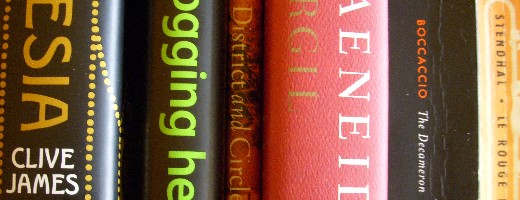Morning Read
A bit truncated, today’s report. I did all the reading, but I’m dashing off to the Rue des Médecins, where I’ll undoubtedly be late.
¶ The Fifth Day of the Decameron is devoted to stories with happy endings, but that’s about all that V, i has. Again, the feeling of two stories thrown together. First, the dolt Cimon — that’s what his name means, in some sort of Greek — who is transformed into a civilized gent by the sight of Iphigenia asleep on a flow’ry bank. But not too civilized! He resorts (in the “second” story) to rapine and piracy in order to win her hand. (And she never seems very enthusiastic about this.) What with all the material that our compiler doesn’t appear to have known what to do with, one wants to send this one back to Mr B for a rethink. “There’s a great story here, Jack…”
¶ In the Aeneid, the shade of Anchises regales Aeneas with a pageant of the glories of Rome to come. Very toadying stuff here. With the end of Book VI, however, I pass the halfway mark in reading through this epic.
¶ Today’s Blogging Hero: Chris Grant of Joystiq. I have never played a video game in my life, aside from FreeCell, Zany Golf, and a DOS-based detective thing, Shadow-something, that Megan was keen on. But Mr Grant sounds quite sympathetic, at least on paper. With two humanities degrees (English and History), he is well-spoken and thoughtful. He also insists that serious blogging is a matter of consistency and regularity.
If BoingBoing every once in a while stopped updating for four days, and then came back and said, “Sorry about that, folks — we’re back,” and then updated with really bad posts for a couple days, their readership would be gone within a month.
As I’m perhaps too fond of saying, I was right to fear that blogging would take over my life. What I didn’t anticipate was liking it so well.
¶ Purportedly writing about Ernesto Sabato. Clive James today riffs first about how hard it is to take criticism and then about the tango. It’s almost as though his nominal subject were radioactive. Mr James can tell a story, though.
I once saw a famously cool literary friend of mine turn angry enough to commit murder. A collection of his critical pieces had just been dismissively reviewed in the Times Literary Supplement, the burden of the review being that somebody of my friend’s high talents should not be wasting his time writing journalism. The paper’s reviewers were still anonymous in those days but my friend knew who the culprit was: a notorious dullard. The victim pronounced anathema not only against the dullard for writing the review, but against the editor for printing it. Clearly he would have liked to see the guilty pair lashed back to back with cable and used as landfill in the Thames estuary, but only after being toasted to the point of death with a flame-thrower. I was so shaken by the spectacle of his white lips and clenched fists — one of the fists had a pint of beer in it, so there was danger from flying glass — that I had trouble remembering three pertinent facts. The dullard’s sedulous mediocrity was fully revealed in his piece for all to see; almost every piece in the book that he had reviewed was more intransigent than the review; and it had been scarcely twenty-four hours since the victim, in that same pub, had given me a withering lecture on my absurd sensitivity to criticism.

